Reference Photo and Collage Sources on Flickr
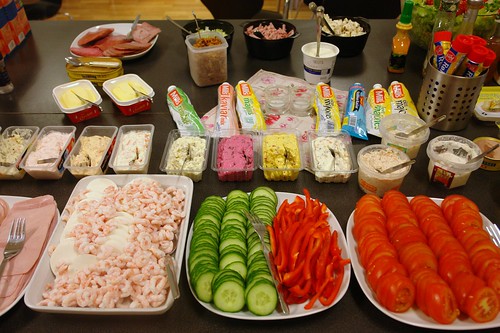
Smorgasbord by Flickr user CharlesFred. Click image to visit on Flickr.
Say it with me, illustrators: "Photo references are good. Use them." Using references is not copying, it is not cheating. Image references are tools. What's an easy way to make sure you're not trodding on another artist's toes? Search within the Creative Commons.
What is Creative Commons? The Creative Commons license is a legal way for creators to easily share their content with the public. It is not a negation of copyright. There are different kinds of licenses depending on the type of content (music, images, literature, software, and so on) and how the creator wishes to share this material. I release my work under a Creative Commons license (there's a link over in the left column of this page) because I believe that information and influence should (and do) flow freely among creators. The license does not prevent me from earning income from my art. I still own what I make. Creative Commons makes it easier for me to share it with others. You can read more about Creative Commons here.
Even with the Creative Commons license, copyright and usage is a slippery slope. When in doubt, contact the creator, ask permission, and give them credit.
The Flickr Creative Commons search is a fantastic tool for finding photo references for drawing, painting, illustration, or the medium of your choice. You need a Flickr account to use it - it's easy to sign up. Click on the word "Search" in the upper right-hand corner, then click on "Advanced Search." Enter your search terms and parameters, then scroll down to the bottom of the search form, where you will find the Creative Commons box. Click "Only search within Creative Commons-licensed content." And go. You can also browse by license.
UPDATE: Here's a tip from optimization expert Tim Ferriss. Do a Creative Commons search on Flickr, then sort the results by "Most Interesting." You'll get the best images first.
The Flickr Commons (sounds the same, but isn't) is another bountiful image resource. Here are some goodies I found there.
My collaborative sketchbook pal Karo recently posted her favorite Flickr groups for gathering collage material. They are Collage Images, Vintage Illustration, and Mid-Century Illustrated. These groups collect and display images that are old enough to be public domain, or with no known copyright restrictions. Some of the images in the Collage pool are contemporary creations whose owners have provided them for use by others. The ownership of certain original ephemera objects (which are scanned and uploaded to Flickr) are sometimes in question, but this community of artists (usually) acts responsibly in investigating and attributing the sources of these images. Here is a discussion thread on that topic.
These are just a few of the tools artists can use to build their photo reference library. (Beware, your collection will grow when you're not looking. Mine takes up a full filing cabinet.)
Related: Figurative Collage set on Flickr Great anatomical reference site Winston Smith, collage artist Lawrence Lessig, copyright reform guru
Which Art Student Are You?
This series by illustrator and art educator Chuck Dillon (his website, his blog) speaks directly to my art school experience. I'm not sure which category I fit in to, so I'll just go with the one that happens to look EXACTLY like me, down to the paintbrushes stuck in the overalls pocket:
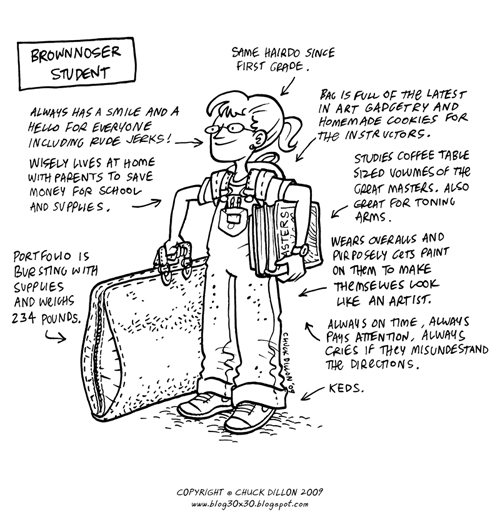
Brownnoser by Chuck Dillon. Click image to view source.
Steve Brodner Interviewed by Steve Heller
Steve Brodner has posted an interview (by Steve Heller) on Drawger. Anyone curious about why artists do what they do should read his point of view.
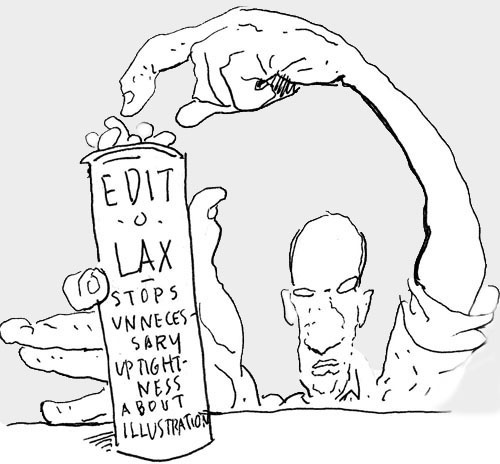
Brodner speaks with remarkable clarity about visual communication:
SH: Many of your caricatures are politically motivated. Do you believe that your art will have some impact on politics? SB: Nope. I learned a long time ago that the point of it has got to be the love of communication in pictures with strangers about important things in a way that has a chance to be meaningful and compelling. How people react is up to them. Some engage, some don’t. My job is to light the lamp as best I can.
Show Us Your Process!
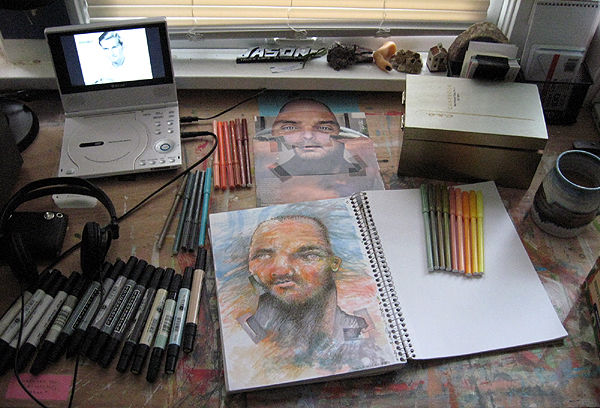 Foggy drawing, desk view. Click image to view full-size.
Foggy drawing, desk view. Click image to view full-size.
I love it when artists blog about their creative process, giving us look behind the scenes. It's important to remember that artists are not magicians. Our creative work does not appear out of thin air; it's work. Here are some of my favorite artists' blogs with links to process-related posts.
Debbi Kaspari is an Oklahoma artist/naturalist currently at work on a field guide to the birds of Trinidad and Tobago. She also manages to write a wonderful blog showcasing many of her sketches, plus bonus things like drawing birds from paper models.
Abbey Ryan makes a painting a day. Wow. (Here are some other artists who also make a painting a day. And they have a book!) Have a look at this video to get an idea of how she builds her paintings.
Jason Hackenwerth documents the construction of his fantastical sculptures in great detail.
James Jean blogs about his sketchbook and works in progress at ProcessRecess. (Some images, while beautiful, are NSFW.)
Also: The Tools Artists Use Creative Workspaces blog Artists' Studios Flickr pool
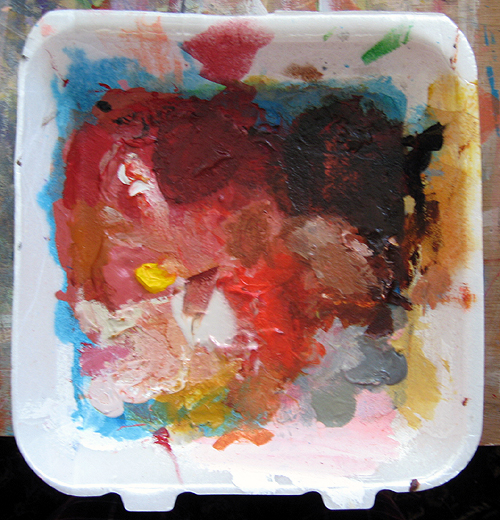
A casualty of The Process: one of my palettes after a painting session. See more palette photos in this Flickr set.
To learn more about my process, you can look in the navbar to your left, under "Category" and click "Process." Here is one of my favorite posts showing in-progress paintings.
Sketch Series: Dr. Sketchy's 04.05.2009
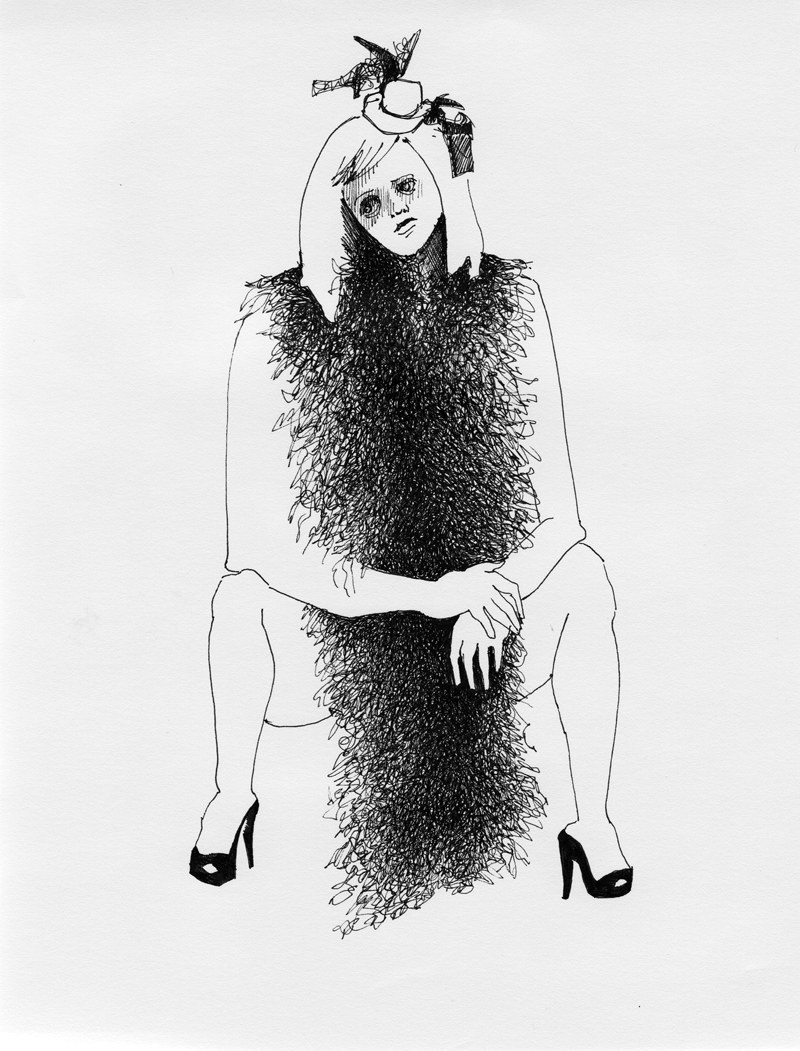 Merry in a Feather Boa, ink on paper, 2009. Click image to view on Flickr.
Merry in a Feather Boa, ink on paper, 2009. Click image to view on Flickr.
Click here to see my other Dr. Sketchy's drawings. Click here to see the Dr. Sketchy's OKC pool on Flickr. Click here to learn more about Dr. Sketchy's Anti-Art School.

